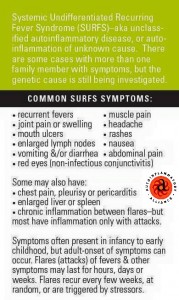 Here you will find general information about 504 plans and specific information and tips for enacting a 504 plan for children with autoinflammatory diseases, often referred to as periodic fever syndromes.
Here you will find general information about 504 plans and specific information and tips for enacting a 504 plan for children with autoinflammatory diseases, often referred to as periodic fever syndromes.
Click here to download a PDF of this post.
What is a 504 Plan?
A 504 plan is an educational plan for students with medical conditions that need accommodations at school, but who may not necessarily need special education services at the school to manage their disease or disability that an IEP would cover. Many children with autoinflammatory diseases may be covered under the 504 plan system, but some with more severe systemic impairment, or a learning disability from their disease may need an IEP.
The name “504” comes from section 504 of the federal Rehabilitation Act of 1973 that prohibits discrimination because of a disability. All schools in the United States that receive federal funding (this includes most all public schools) must make 504 plans available to any student in need or risk losing its federal dollars. This is a federal statute, so these public schools must comply with a request for a 504 plan, and adhere to it–this is not an “optional” program. Any student between the age of 3 and 22 years of age can get a 504 plan for the public school system that covers him or her through high school. Private schools are not required to use 504 plans if they do not receive federal funding.
Note that a 504 plan is similar to, yet different from, an Individual Education Plan (IEP). Whereas an IEP makes accommodations for a student’s learning disabilities, a 504 makes accommodations based on an illness that impacts the child’s school time and school work, but does not impact the ability to learn. The child does not need to have a learning disability to qualify for a 504 plan, however some kids may need both a 504 and an IEP. In some states, if a child needs both an IEP and 504, it will all be covered under the IEP.
If you have a child that cannot attend school regularly or has challenges during school due to frequent flares of their autoinflammatory disease, or other symptoms related to their condition, it would be a good ideas to establish a 504 plan early in their educational experience.
Does My Child Really Need a 504 if He or She is Doing Well in School?
If your child has a chronic illness that causes missed time in class and/or difficulty in getting assignments done, you do need to consider a 504 plan, even if your child is only in elementary school, in kindergarten even, and the teachers are currently making accommodations without a 504 in place. Those accommodations need to be put in writing in a 504 so that they can continue as your child gets older.
Even if your child may not seem to be having too many challenges, starting the process early can be helpful, in case issues arise later in the school year, or even a few years later. It is much easier to have a 504 plan in place, with clauses to cover things that may arise sporadically, than to not have a plan and then have to address these issues when your child is not doing well. A 504 plan will also give you a formal approved plan for your child that needs to be followed by the child’s teacher and other staff.
A 504 is a Legal Document
Once you have a 504 plan in place, you have a legal document on your side. The earlier this is in place, the easier it will be. If there is an issue with compliance, the 504 will support your case if you have to take things to a higher level for compliance issues. The 504 plan protects the child and his or her education for their entire school career and may become necessary when your child is in middle school and/or high school. By having a 504 plan already in place before problems arise, you will be better able to address your child’s educational needs should their health affect their education.
Review your child’s 504 at least yearly and have a meeting to update it if needed. At a minimum, the 504 plan needs to be reviewed and updated at least every 3 years, when the child moves to a new school, or advances to a higher level of schooling, such as moving from middle to high school. If you do not get it renewed in the time frame, it may become invalid, or have to be redone. Having a plan that is working is much easier to re-establish or adapt in a new or advanced school setting than to have to start all over. Colleges may request such documents to validate the child’s needs when they are applying for admission. If there are learning needs that may impact their ability to take the placement exams, such as the SAT or ACT, an appropriate 504 plan will be used to help with obtaining the right accommodations for the testing center.
How Does a Child Qualify for a 504?
According to the statute, determination of qualifying for a 504 is based on:
“To be protected under Section 504, a student must be determined to:
(1) have a physical or mental impairment that substantially limits one or more major life activities; or
(2) have a record of such an impairment; or
(3) be regarded as having such an impairment.”
The child’s grades are not a determining factor in 504 status. A straight A student qualifies if their illness limits life activities. According to the U.S. Department of Education Office for Civil Rights:
“Major life activities, as defined in the Section 504 regulations at 34 C.F.R. 104.3(j)(2)(ii), include functions such as caring for one’s self, performing manual tasks, walking, seeing, hearing, speaking, breathing, learning, and working. This list is not exhaustive…In the Amendments Act, Congress provided additional examples of general activities that are major life activities, including eating, sleeping, standing, lifting, bending, reading, concentrating, thinking, and communicating. Congress also provided a non-exhaustive list of examples of “major bodily functions” that are major life activities, such as the functions of the immune system, normal cell growth, digestive, bowel, bladder, neurological, brain, respiratory, circulatory, endocrine, and reproductive functions.”
Video: What is a 504 Plan? – The National Center for Learning Disabilities
So Does a Child with a Periodic Fever Syndrome/Autoinflammatory Disease Qualify for a 504?
Take note that the statute specifically states that illnesses that impact the functions of the immune system qualify. Any child with an autoinflammatory disease has an illness that impacts their immune system and should qualify for a 504 if the symptoms impact their attendance or ability to complete classwork and homework on time. However, the wording in the statute is also vague in some areas, and the school must agree with the parent and a doctor that a 504 is required to meet the student’s needs.
Some parents need to educate school staff about the illness, and be persistent in obtaining a 504. Technically, once a 504 has been properly requested by the parent, the school has a set number of days to comply and work on it. Fortunately, many schools are willing to put a 504 plan in place to meet the individual education needs of the student. However if you believe your child needs 504 accommodations to succeed in school and the school does not agree, do not give up. Persistence does pay off. If needed, you may have to talk to the school district or consult a local special needs advocacy organization to help you. Many advocacy programs offer their services at no charge.
How Do You Get a 504?
To start the process, have a meeting with your child’s current teacher, or school counselor. This can be informal to just tell him or her that you want a 504 for your child. From there, an official meeting should be scheduled. Ask that all invested parties attend this meeting. This can include the current teacher, past teachers, the principal, school counselor, school nurse etc. Come to the meeting prepared with information on your child’s condition and a letter, or letters from their treating doctors.
The medical letters should:
- Clearly state the diagnosis
- Clearly state that symptoms of the autoinflammatory disease, including fever or rashes, are not contagious
- How the illness impacts the child’s life activities (Examples: may be too sick to attend class at times, may not be able to do physical eduction sometimes or at all etc.)
- Summarize the main concerns for their health needs
- Suggested adaptations that can help the child at school
- The way that classwork, homework, or projects will be handled during that time when they have disease issues (Example: Doctors may state that child may not be able to do work even at home during a flare, so due dates need to be flexible.)
You are allowed to make your own suggestions for the 504 also, so make your own list to prepare for the meeting. But it helps to have a talk with the doctors before they write the letter to discuss the needs, so you both have a similar plan in mind. Have the doctor send you the letter, rather than directly to the school, so you can review it before giving it to the school. Having this in writing from the doctor makes a big difference for the process! The pediatrician, physical therapist, immunologist, rheumatologist, and any other medical professional treating your child can have input.
This one meeting may be the only meeting you need to complete the 504, but some schools may require further meetings and evaluations.
Inform and Educate
Since autoinflammatory diseases are such rare diseases, providing information and educating the school staff is essential to the 504 plan process. You will need to provide educational materials to the principal, teacher, and school nurse on your child’s condition. We have some helpful educational materials in our resources section. Also, this is a good video to share.
Put into the 504 plan that this medical info and materials, along with a copy of the current and the 504 plan must be given to any substitute teachers before students arrive to school or as soon as teacher arrives to school.
In addition, you may also want to prepare some other helpful materials to educate the teachers, and students about these diseases. Here is a nice idea to make a customized guide about your child’s needs, tailored just to them. Some children have even written their own story about their disease to share with others!
Tips for a Successful 504 Plan
- Communicate often – with patience and on friendly terms. The teacher needs to understand your child’s condition and how it affects life activities. Talk to the teacher often about how things are going at home and at school from your perspective so the teacher can have that understanding. You may have to become a squeaky wheel to get what you need, but try to be a friendly squeaky wheel so the school is not put on the defensive.
- Bring an advocate with you to meetings if the school has been resistant to a 504 plan. Anyone can be your advocate; a friend, doctor, lawyer, anyone. This person may, or may not participate in the meeting depending on what level of help you need. An advocate can even just sit in the back of the room and take notes on what was said by all parties involved.
- Revisit the 504 plan regularly. As your child goes through school, you will probably find adjustments need to be made to the plan. Meet with the school staff at least once a year to update the 504, but if needed, it can be revised at any time. If it is working well as it is, the 504 will only need to be updated and renewed at least once every 3 years.
- Put everything you can think of into the 504. It’s better, and easier, to not use something in the plan than to learn you should have put something in your child needs later. At the same time, you can call a meeting to change the 504 at any time.
Funding the 504
Although federal law mandates the 504, it does not come with any funding. Keep this in mind when adding accommodations that may cost the school money. Certain accommodations may be better met with the IEP process. Of course, you should ask for everything your child needs to succeed and the school will be required to implement everything in the 504, but understand this is why some schools are resistant to 504 plans.
A Note About Standardized Testing
Know the laws in your state regarding standardized testing. Students may not have to take these exams. Many states have opt-out options. Put into the 504 that your child will not be penalized or excluded from activities for not taking standardized tests. For example, many schools have parties for kids who take the test, which excludes the children who did not take the test. Your state’s department of education website should have the state’s regulations regarding standardized testing posted.
Sample 504 Plan Suggestions for Kids with Autoinflammatory Diseases
Every 504 plan needs to be tailored to the child’s needs and abilities. No two will be exactly the same. These are merely suggestions, and not all are needed for everyone, while some students may need additional adaptations.
With any of the following as needed, add the term “without penalty.” This will protect your child from any disciplinary action for not completing assignments on time and for excessive abscesses and tardiness. For example, your child should not be kept in from recess for not completing a homework assignment on time if he was ill the night before. Nor should he get detention for showing up late to school due to a doctor’s appointment or just needing more rest in the morning. This will also prevent late assignments due to illness or medical appointments from affecting your child’s grade.
The following are ideas of what your child might need in his or her 504 plan, but this list is not exhaustive.
- All absences and tardiness and early dismissals due to illness or doctors’ appointments will be considered excused without requiring a doctor’s note. These will not count against grades.
- Permitted to do school work at home when unable to attend school or unable complete class work while in school.
- As needed, student shall be permitted to attend school for partial days for extended periods of time.
- Homebound services option. Most school districts do have homebound services available where a teacher can come to the house when a child is unable to attend school for long periods of time. The 504 can state that if the student misses X number of days, the student will be switched to a homebound program. Often, to qualify you will need a doctor’s note stating the duration of the absence (usually over 2 weeks of school) to initiate homebound instruction with the district.
- Provide a quiet place to do work or rest. Your child may need to rest periodically in the office or nurse’s room or need a quiet room to work or take a test if noise worsens symptoms such as headaches.
- Teacher(s) will send home missed work regularly so your child does not fall behind more than necessary.
- Teacher will provide a copy of teacher class lecture notes as needed.
- Online virtual classes may be taken in lieu of some in school classes. Your child may be able to take some classes on campus and some online to meet graduation requirements.
- Noise canceling equipment. For hearing impairments or for headaches, your child should be allowed to wear noise canceling equipment and/or other hearing devices in the classroom. Some schools may be able to provide a personal hearing amplification system to help kids focus on listening to the teacher and cancel outside noise. Ask the special education teacher or speech teacher for this equipment.
- Physical Education (PE) class modifications. Your child may be able to participate in some activities or not at all. Be specific as to what your child’s limits are for PE. Most students can be accommodated in the standard classes, and will not need to be in adaptive PE, if the teachers are willing to work with the 504 plan and the student.
- Access to water, food, and bathroom at all times. ALL students with a 504 plan should include this. Too often water and bathroom breaks are restricted in schools. This freedom should be allowed at all times without exception, including during tests. If your child has special food or drink needs, such as drinking Gatorade in class, include that too.
- Plan of care for when a fever hits. Include a detailed plan as to the school’s responsibilities when a flare starts. Can he stay at school? Should the parent be called? Can they give a prescribed medication at school, or call mom or dad to give treatment? Any medications left at school will need a form filled out with instructions by doctor, even for over-the-counter (OTC) medications. Some may require the medication to have a prescription label issued on it for your child, even if it is an OTC medication.
- Signs and Symptoms You need to provide the school with a list of symptoms to watch for to determine if your child is in a disease flare, or having other disease-related issues.
 Adaptive equipment is OK to use. This may include large markers or felt tip pens for arthritic hands, pencil grips, softer lead pencils, an iPad or electronic device for taking notes, or a calculator in math. If you need to have an Occupational Therapist evaluate their needs, this needs to be addressed with the doctor, and also may require an IEP evaluation, but may be worth it. Painful hands and joints can affect performance in class.
Adaptive equipment is OK to use. This may include large markers or felt tip pens for arthritic hands, pencil grips, softer lead pencils, an iPad or electronic device for taking notes, or a calculator in math. If you need to have an Occupational Therapist evaluate their needs, this needs to be addressed with the doctor, and also may require an IEP evaluation, but may be worth it. Painful hands and joints can affect performance in class.- May do assignments/tests verbally with teacher instead of in writing. Student may dictate written assignments to teacher or parent. This is good for kids with painful joints or headaches.
- The student will be provided with the needed class notes, worksheets, and other materials in writing. This is critically important in the upper grades, as some teachers base all the work on in-class experiences and note taking. It is very difficult, demeaning, and distressing for children to be expected to coordinate obtaining copies of fellow classmates notes, which some teachers will suggest is the only option. Do not settle for that, especially if this clause is stated in the 504. Students are often very hard working and motivated children that have these diseases and tolerate a lot of pain daily. They do not want to stand out or want to feel like they are imposing on their classmates. In addition, these children that are suffering from these diseases may already feel isolated or misunderstood by others, and having to rely on other children for notes and work affects their friendships, peer relations, and self esteem. All educational material must come directly from the teacher and not other students.
- Homework and make-up work due dates and assignments will be flexible. Since students often need rest after school, completing homework on time or completely is often impossible. It can be stated in the 504 that the student does not have to do all homework assignments, or they may choose selected problems or assignments based on learning goals rather than have to do all the class work. If modifications to school and homework assignments are not made, then a chronically ill student will always be behind in work, and never have free time or rest time outside of school.
- Have textbooks at home and at school so the child does not have to carry the books back and forth.
- Child needs to sit where they can best see and hear the teacher, and to see the assignments on the board.
- Accommodations for sitting in classroom. Some kids may not be able to sit on floor (circle time) with legs crossed or need a more comfortable chair.
- Student may stay in the classroom or office during recess and/or lunch as needed. Student should be permitted to have a friend join them so they are not left out of social activities.
- Locker placement. Consider selecting a locker location so your child can walk shorter distances to and from classes if needed. They may even need an extra locker assigned to them if the campus is very large.
Video: Section 504 of the Rehabilitation Act of 1973: 504 Plans at School
What if the School Refuses to Comply with a 504 Plan?
If you are having trouble either getting a 504 plan in place or with a school not complying with a 504 plan, you can file a complaint with the Office for Civil Rights. Click here for Office for Civil Rights contact information.
Do you need a printed copy of this article to share with the school, or others? We have this article in a handy PDF for you! Click here to download a PDF of this post.
See more school resources on our Pinterest board:
Follow Autoinflammatory Alliance/SAID Support’s board School Issues on Pinterest.
References and Resources
- Autoinflammatory Alliance Patient Resources
- Arthritis Foundation: Sample 504 Plan Accommodations
- About.com: Sample 504 Plans
- Mt. Diablo Unified School District 504 Plan Template
- Great Schools: A Parent’s Guide to Section 504 in Public Schools
- U.S. Department of Education Office for Civil Rights: Frequently Asked Questions About Section 504 and the Education of Children with Disabilities
- Wrights Law: Discrimination: Section 504 and ADA
- National Center for Learning Disabilities: Section 504 and IDEA Comparison Chart
- Special Needs Resources: Back to School: How to Write your Child’s “Owners Manual for Special Education Teachers
- Great Schools: A parent’s guide to Section 504 in public schools
*Student using tablet photo by Brad Flickinger, Flickr
*Classroom photo by vijay chennupati, Flickr








How can I get brochures or info cards on TRAPS for school teachers
I am so thankful for this site!! All your hard work & time is greatly appreciated!!!!
Thank you
Hi Cathy,
Email Karen at karen@autoinflammatory.org and she will send some out to you.
And you are welcome! We are so glad you have found this helpful.
Jennifer
Our daughter is going back to traditional school after several years of being homeschooled while rebuilding her health. This is so incredibly helpful for us–can’t thank you enough.